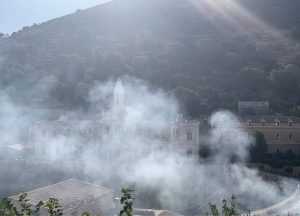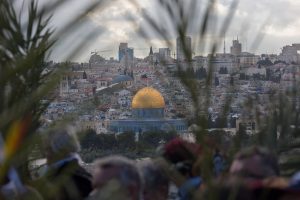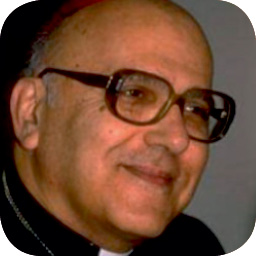Who are we Palestinians? We are those who have lived in Palestine generation after generation, through the change of conquerors, states, and regimes. Who we are today is who we were yesterday. The entire history of this land named Palestine, or Israel, or Canaan, or whatever, is our history. We are the Palestine of today, yesterday, and tomorrow.
Who are we Christian Palestinians? We are very simply Palestinians who are believers in Jesus Christ. Our faith goes back to the days when Jesus himself was here in this land. We were all born here in Jerusalem on the day of Pentecost. Here is our faith and our history. Christian Palestine is also a part of the history of all Palestinians – Christians, Muslims, Jews, or Samaritans (the small community that is still present today in the Palestinian city of Nablus). The history of each is the history of all because all Palestinians belong to all of Palestine, to the land as well as to the history and its various religions. At the time of Jesus Christ, we spoke the same language as Jesus – Syriac or Aramaic – with all the people of Greater Syria. Then we spoke Greek, with the Byzantine Roman empire. Then we spoke Arabic after the Muslim Arab conquest. Palestinian Muslims today were largely the same Syriac (or Greek) Christians who converted to Islam. Christians and Muslims, we belonged and we still belong to the same people and share the same history.

What is our future? Will there be Christians here in future generations? Many Western writers, even church people, think that our churches will become museums in the near future. Yet, I firmly believe that this will not be our fate. We will remain a living community, always small, born on the day of Pentecost, belonging to a land called holy, called Palestine, witnesses to Jesus Christ in his land. Rooted in our human community, we are also rooted in the mystery of Jesus. We are part of Palestinian human history and part of the mystery of Jesus, in whom we believe. We are also part of worldwide Christianity. This universal dimension does not separate us or contradict in any way our belonging at the same time to our people, to the mystery of God, and to the universality of the history of our land. The spirit, the faith, as our link with God, makes us as universal as the whole world. With this sense of universality and spiritual greatness that comes from the mystery of God in this land, we know that our Lord Jesus Christ told us – and all Christians everywhere: “You are the salt of the earth” (Mt 5:13–14), which means that we will remain a small ingredient of society, just as salt is wherever it is used. When speaking to his disciples, Jesus often urged them to accept that they are few in number and that they should not be afraid: “Do not be afraid, little flock” (Lk 12:32). “Do not let your hearts be troubled or afraid” (Jn 14:27). It is true that numbers are important for nations and armies, but for the power of God, and for the spirit, it is not the law of numbers that prevails but rather the law of the spirit that “blows wherever it wants” (Jn 3:8). When we need numbers, we find them in the nation, with all the citizens.
Our future is the same as the future of all Palestinians and depends on the continuing struggle with Israel and Western politics. Physically, our death or our life, or our emigration, as Palestinians and as Christian Palestinians, depends on this ongoing struggle. Where this struggle will lead us, we do not know. Not even the strong and powerful in this land know where they are heading. They say that they are in search of security, but instead, they are heading towards more insecurity. And this will mean more insecurity for us as well.

Many make a direct link between our near disappearance and the relations between Muslims and Christians. For 14 centuries we have lived together and experienced bad and good days. We have reached a certain equilibrium, a mutual acceptance and cooperation. We have not yet reached perfect coexistence, but we are walking in the right direction. In the midst of this consistent stride towards accepting each other, religious extremism and fanaticism have surfaced among Muslims and Christians. ISIS and its impact on Muslim society is an expression of this. Here, we must ask the important question: Who is responsible for this timely apparition of religious extremism? We know that there are seeds of sectarianism in the depths of the soul of every believer, Muslim, Christian, and others. There is a violent instinct to defend religion even with bloody wars. We have seen it frequently in human history, and in Christian history as well. It is strange how the most benevolent power in the hands of humans, namely their relationship with God, allegedly a fountain of all goodness, could be transformed by believers into a power of destruction and death. We know that the seeds of this behavior are present in each of us, latent, ready to be awakened by anyone who wants to use or abuse them. And now we must ask: Who has awakened them, who has exploited them as a means of destruction in the Middle East? The same ones who pretend today to fight against extremism. They have awakened this destructive power in believers. The same Western politicians who want to reshuffle the Middle East, after having unsettled it, have exploited this hidden force in the region. ISIS is a terrible scourge. But those who created it are an even greater threat.
Today, we are facing perils, political instability, and forced emigration. One of the most dangerous factors is the politics of the West in conjunction with the politics of Israel. The people in the West today – Christians, believers, and nonbelievers – are good, friendly human beings. But there is also a “murderous” political West, bent on creating a new Middle East, whatever the cost may be. For these Western politicians, Christians do not exist; whether we live or die does not matter to them. Since the creation of the state of Israel, this political West believes that the Middle East must adapt to this new reality, which means that we and the region must adapt to death, civil wars, and confusion. In Palestine, we have to adapt to settlements, destruction of agriculture, confiscation of land, house demolitions, arrests, political prisoners, the siege of Gaza, etc. All this belongs to the domain of death. But death cannot produce anything other than death – even for those who inflict it. If the murderous West wants life, it must change its politics in the region into a politics of life. Our future, to exist or not, depends on the West’s politics of death or life. The “good” West should ask, resist, and educate its leaders in order to create a new West, a West that believes more in humanity and the capacity to be good, respecting the equality and human dignity of peoples all over the world, rather than awakening death among them. Sadly, our future seems to be overshadowed by the reality of death. However, we remind all people, the strong as well as the weak, that not so long ago, other deadly powers appeared, in the West to be precise, and then disappeared.

What is the future of Christian Palestinians? Despite all the difficulties mentioned above, it is up to us to rely on ourselves, to know who we are and what we want. Our belief in Jesus Christ will give us strength in this endeavor. For Jesus said: “In truth I tell you, if your faith is the size of a mustard seed, you will say to this mountain: move from here to there, and it will move; nothing will be impossible for you” (Mt 17:20; Mk 9:29; Lk 17:6). Jesus also said: “In all truth I tell you, whoever believes in me will perform the same works as I do myself, and will perform even greater works” (Jn 14:12). Jesus said that we have the power to move mountains, which means that we have the power to change situations and conditions of life, regardless of the power of evil and destruction that threatens us. This means having a new vision of ourselves, entering a new period in our history, beginning a new life, while remaining strong within our present reality of struggle, oppression, and death. Moreover, we Christians are not alone in our society; we can find a spirit of cooperation among our fellow citizens and in the universal human community. The struggle is the same for all. Christian Palestinians, all Palestinians, and all people of good will should unite their efforts in order to create a more human community, here in this Holy Land, in the West, and all over the world.


